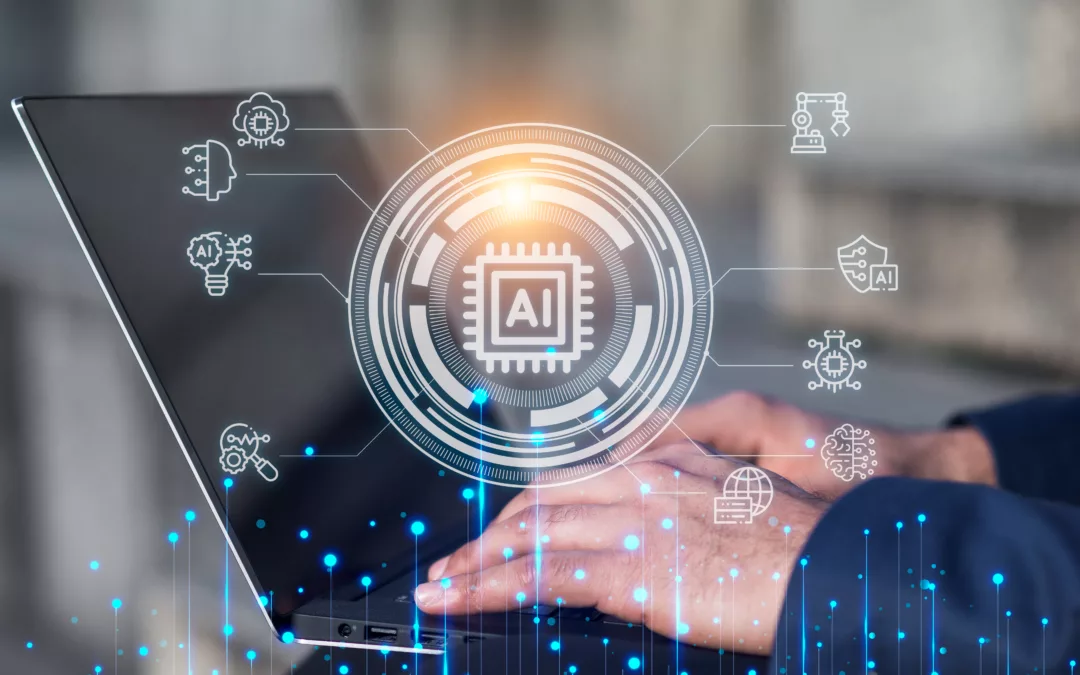AI has undeniably emerged as a transformative force in the business world. Every time, more companies leverage AI with diverse use cases to innovate, optimize operations, and gain competitive advantages. According to Deloitte’s survey, the top use cases of AI across industries include cloud pricing optimization (44%), voice assistants and chatbots (41%), predictive maintenance (41%), and uptime/reliability optimization (41%). Even though the use cases could vary by industry, here you’ll find some of the most popular.
Enhancing Customer Experiences with AI
AI has helped improve customer service and engagement. Chatbots and virtual assistants, powered by AI, are now capable of handling customer inquiries 24/7, providing instant support and freeing up employees to tackle more complex issues. Personalization engines use AI to analyze customer data, enabling businesses to offer tailored recommendations and services. This level of personalization not only boosts customer satisfaction but also increases loyalty and sales.
Case Study: AI-Powered Chatbots
According to studies, approximately 60-80% of inquiries are repetitive. With this in mind consider a retail company that implemented an AI chatbot on its website. A chatbot can easily handle most customer’s inquiries without human intervention, reducing time response from hours to seconds and increasing customer satisfaction.
By automating responses to frequently asked questions, your support agents can free up their time to focus on more complex tasks. With the help of AI, these routine queries can be handled efficiently, allowing your team to prioritize personalized interactions and provide a more satisfying customer support experience. A good example is the launch of New York City’s first AI chatbot. The chatbot simplifies interactions with local government, making information on business operations, compliance, incentives, and best practices more accessible to all.
Streamlining Operations with AI-Driven Automation
Operational efficiency is another area where AI shines. AI algorithms can optimize supply chains by predicting demand, managing inventory levels, and identifying the most efficient delivery routes. Robotic process automation (RPA) takes over repetitive tasks, reducing errors and increasing productivity. This automation extends to back-office operations as well, where AI systems can manage tasks such as invoicing, payroll, and compliance checks.
Case Study: AI in Supply Chain Management
Amazon harnesses the power of AI to analyze and optimize delivery routes, dynamically adapting to traffic and weather conditions in real time. Additionally, they employ artificial intelligence to forecast the daily demand for over 400 million products, predicting where orders are likely to originate from around the world. This enables faster delivery, as delivery stations increase their capacity from handling 60,000 packages per day to over 110,000 during the holiday season.
Case Study: IT operation management
OpsRamp’s report highlights the widespread adoption of AIOps platforms by enterprises. These platforms serve various purposes, including intelligent alerting (70%), root cause analysis (57%), anomaly and threat detection (52%), incident auto-remediation (50%), and capacity optimization (27%). This demonstrates the significant role that AIOps play in enhancing operational efficiency and proactive problem-solving within organizations.
Data-Driven Decision-Making with AI Analytics
AI’s ability to process and analyze vast amounts of data is unparalleled. Businesses use AI-driven analytics to gain insights into market trends, customer behavior, and business performance. Predictive analytics can forecast future scenarios, helping companies to prepare and adapt. These insights drive strategic decision-making, ensuring that businesses are not just reactive but also proactive in their market approach.
Case Study: Predictive Analytics for Sales Forecasting
Sales forecasting leverages advanced machine learning and data analysis techniques to anticipate future sales. The process implies gathering historical sales data, along with additional factors like market trends, and financial indicators data. Then the information is analyzed and utilized to train an artificial intelligence model capable of recognizing intricate patterns, relationships, and seasonal variations.
In this matter, a report by Aberdeen Group revealed that companies leveraging AI for sales forecasting achieve an impressive average forecast accuracy of 79%, compared to just 51% for those who don’t. Additionally, 10% of the companies that use AI are more likely to grow their revenue every year and 7% more likely to reach their quota. This highlights the significant role that AI plays in enabling sales teams to make more precise predictions and ultimately drive better business outcomes.

AI in Human Resource Management
AI transforms HR processes by automating candidate screening, facilitating talent acquisition, and enhancing employee engagement. AI-driven tools can analyze job applications at scale to identify the best candidates, saving time and reducing bias. Moreover, AI can monitor employee satisfaction and predict turnover, enabling companies to better manage their workforce. According to Gartner, 76% of HR leaders believe that if their organization doesn’t adopt and implement AI solutions, they will be lagging in organizational success compared to those that do.
Case Study: AI for Talent Acquisition
A prevalent issue with the hiring process is its slow pace. AI can expedite the process by assisting managers in automatically nurturing potential hires by analyzing resumes and matching them with job descriptions, and providing notifications when a candidate applies for an open position.
Driving Innovation with AI in Product Development
In product development, AI accelerates innovation by simulating design processes and testing scenarios that would be costly or impossible to replicate physically. It enables rapid prototyping, reduces time-to-market, and ensures products are optimized for performance before they are built.
Case Study: AI-Enhanced Product Design
AI product design software is changing the industry as it allows designers to make decisions fueled by data more efficiently. Now, with AI, you can easily use data you’ve collected to make design decisions, as the tools can help you quickly analyze the results and figure out an actionable way to infuse the findings into your product user experience.
French designer Philippe Starck collaborated with Kartell and Autodesk to create chairs designed by an algorithm, which are claimed to be the first commercial products conceived by generative AI. Also, generative design was utilized in the development of Airbus A320neo aircraft, leading to more efficient and innovative designs.
Sustainable Business Practices Through AI
Sustainability is an urgent priority, and businesses are using AI to become more environmentally friendly. AI optimizes energy consumption in manufacturing and reduces waste through smarter resource management. It also helps monitor environmental compliance and forecast business activities’ impact on ecosystems.
Case Study: AI for Energy Efficiency
Smart grids and AI-enabled connected devices empower energy systems to optimize electricity distribution dynamically. Through machine learning algorithms, energy demands can be forecasted, enabling adaptive output to minimize waste. Additionally, AI can autonomously detect anomalies and inefficiencies in systems, alerting users to perform preventative maintenance.
Conclusion
Artificial intelligence is not just a futuristic concept; it’s a practical tool already delivering tangible benefits across business operations. From enhancing customer experiences to driving sustainable practices, the use cases of AI in businesses today are diverse and impactful. As InMind Software continues to innovate with AI, we enable companies to not only envision but also actualize the future of business to one more intelligent, efficient, and ever-evolving.
Are you looking to develop a mobile app that leverages the power of the most cutting-edge technologies? Look no further! Our team of expert developers can help you create more sleek mobile apps that meet your unique needs and requirements. Contact us today to learn more about our mobile app development services and how we can help you achieve your goals.
Find out what’s possible for your business by scheduling a free 30-minute consultation with Omar. Are you curious to see what technology can do for your business? Or, do you already have a vision and need someone to come alongside you to make it a reality?
Our co-founder, Omar Saadoun, is a leading expert in emerging digital technology whose passion is to help business owners like you realize the limitless possibilities of tech.

 Co-Founder & CEO @ Inmind - Blockchain & Mobile Expert | DAO / Tokenization / Web3 | CTO @ Brainstems (Former TIEX) | Board Member @ CUTI
Co-Founder & CEO @ Inmind - Blockchain & Mobile Expert | DAO / Tokenization / Web3 | CTO @ Brainstems (Former TIEX) | Board Member @ CUTI